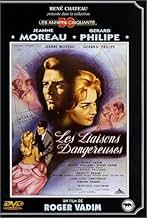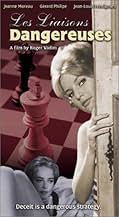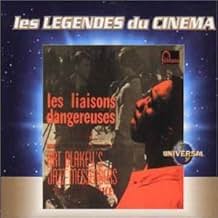Aggiungi una trama nella tua linguaJuliette Merteuil and Valmont is a sophisticated couple, always looking for fun and excitement. Both have sexual affairs with others and share their experiences with one another. But there i... Leggi tuttoJuliette Merteuil and Valmont is a sophisticated couple, always looking for fun and excitement. Both have sexual affairs with others and share their experiences with one another. But there is one rule: never fall in love. But this time Valmont falls madly in love with a girl he m... Leggi tuttoJuliette Merteuil and Valmont is a sophisticated couple, always looking for fun and excitement. Both have sexual affairs with others and share their experiences with one another. But there is one rule: never fall in love. But this time Valmont falls madly in love with a girl he meets at a ski resort, Marianne.
- Regia
- Sceneggiatura
- Star
- Marianne Tourvel
- (as Annette Vadim)
- Petit rôle
- (non citato nei titoli originali)
- Un invité des Valmont
- (non citato nei titoli originali)
- Un inspecteur
- (non citato nei titoli originali)
- Un invité des Valmont
- (non citato nei titoli originali)
Recensioni in evidenza
Jeanne Moreau stars as Juliette de Merteuil, a beautiful but amoral woman. She lives by her own rules, which include serial infidelities and initiating seductions by one of her lovers, Valmont. (Portrayed well by Gérard Philipe.)
The target of their Valmont's seduction is Madame Tourvel, played by Annette Stroyberg. She became Annette Vadim when she married director Vadim after they met while making this movie. She was his post-Bardot sex kitten. (Unlike Moreau, she wasn't born to play the part of a virtuous young wife. She doesn't look pious or modest in the least.)
This movie has some merits--Moreau is perfect, and it's a pleasure to watch her act. Thelonius Monk composed the score, and Art Blakely and the Jazz Messengers have a long set when they are playing at a wild party. There's also the famous telegraph scene, which is powerful in a horrible sort of way.
The movie takes liberties with the plot of the novel, of course, but I think it captures the essence. However, a film about decadence and deceit isn't going to cheer you up. Ultimately, I think the blame lies with the novel, not the movie. It's a story about people that we don't like, and for whom we don't care much. That pretty much sums up my thoughts of the film.
The movie has a lackluster rating of 6.9, which which I agree. I rated it 7.
A book that has been filmed many times, this early Vadim version is not only one of his best movies. He manages to reduce the bitching to a grand dramatic flourish, not a raison d'etre. Unsurprisingly. He was known off-screen for his sensual and avant-garde lifestyle. On-screen he can portray sensuality with realism and accuracy. (Even if the nudity is tame by today's standards.) Unlike most leads, Valmont doesn't just make girls swoon by appearing in frame. He tells them what they want to hear. If it weren't for the moralistic ending deemed necessary by popular culture, the movie could be a handbook of seduction. For the script has a feeling of authenticity.
Vadim has been described as the "classiest exploitation filmmaker who ever lived." Bardot, one of his five wives, called him, 'seduction itself.' (Of the men she married after him, she said dismissively, "They were only husbands.") The skill with which Valmont and Juliette entrance even gorgeous young ingénues is masterful. If all lovers possessed such consummate ability, might the world be a happier and less frustrating place? But, inevitably, our pair not only misuse their technique, failing to put the good of their conquests uppermost, but fall into the one trap they thought they could always avoid . . .
Cinematography in Dangerous Liaisons is straightforward cinema at its finest. The vicarious pleasure of boldly careering down the Alps almost made me want to take up skiing too. Simple use of black and white photography is mirrored in the appealing, clear-cut personas that Valmont projects. He lies in the snow, confidently dressed in black, with the virtuous Marianne all in white nest to him. Simple shots. Valmont on a train station - silhouetted against the steam. Figures on an empty beach plus a few horses. Such composition is breathtaking. Especially with the high-keyed psychological tension that runs through. And when someone gets a sock to the jaw, it sounds real, not like it usually does 'in the movies'.
Temptation to go beyond the bounds of their seducers' art has a number of dramatic purposes. It provides a great theatrical crescendo. It gives a nod to the original book. And it 'keeps the peace' with the morality of monogamy. As Valmont's hedonism leaves its own well-defined limits, he shouts over the jazz, like a soloist insisting on ill-timed attention.
The didactic attitudes to pleasure of the day are one of the reasons that Vadim's original Dangerous Liaisons works better than in more modern interpretations. Today's woman (and man) likes to make independent choices, as well as be wooed intelligently. The careful plotting of Vadim's philanderers is more evil in a time when 'goodness' is equated with sexual ignorance Juliette and Valmont are 'clear-headed' rather than 'jealous' of each other's affairs. They have been together eleven years. Does no-one observe that this is a longer innings (by their own admission) than any of their more conservative friends? Instead of the Machiavellian rendering of the protagonists in other versions, Juliette and Valmont are ultra-chic. And, until they come off the rails, ultra-desirable.
Dangerous Liaisons is the movie that brought Jeanne Moreau (Juliette) to an international audience. Her full-on pout projects an aura of sexuality (compare her here with her performance in films such as Lumiere and L'Adolescent to see what a consummate act it is). She conquers us by identifying her 'amoral' lifestyle with a moral high ground (and one which indeed persists longer and more convincingly than that of her husband). When she refuses to sleep with him early on in the movie, she explains that she is never 'unfaithful' to her lovers. She shares the details of her current suitor with him intellectually rather than physically. And she is the first to be appalled at the human wreckage that Valmont's unconscious search for emotional truth is leaving in its wake.
We maybe tend to think of French New Wave films as being terribly provocative. Yet they could only be provocative within the bounds of the strong French censorship of the time. Films about Indochina and Algeria were halted. Dangerous Liaisons was briefly suppressed for painting an unflattering portrait of French diplomats. The Centre National de la Cinématographie strengthened its power over controversial scripts after its release. But the New Wave 'rebelliousness' associated with the influential Cahiers du Cinema group of directors like Godard and Truffaut was initially that of that of the 'youth class'. It was in relation to Vadim's work that the term was first coined.
Even sophistication has its limits. And this film dashes the intellectualism of high art on its head before bringing us to its gratuitously high moral conclusion.
Lo sapevi?
- QuizThe film was released eight weeks before Gerard Philippe's sudden death.
- ConnessioniFeatured in L'amore dura tre anni (2011)
I più visti
- How long is Dangerous Liaisons?Powered by Alexa
Dettagli
- Tempo di esecuzione1 ora 51 minuti
- Colore
- Proporzioni
- 1.37 : 1
- 1.66 : 1
Contribuisci a questa pagina

































